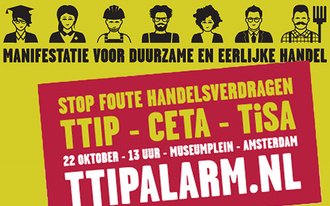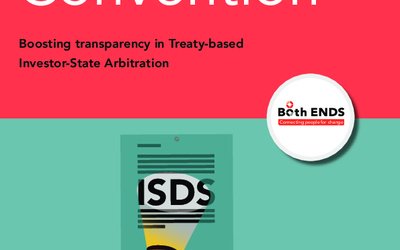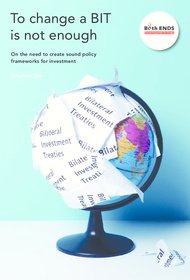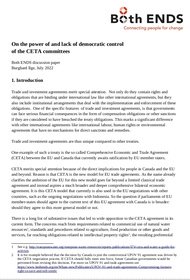5 alternative arguments against TTIP
Both ENDS will join the protest against trade treaties TTIP, CETA and TiSA on Saturday October 22nd in Amsterdam. These treaties will have negative impacts, not only in the Netherlands and Europe, but also - and maybe even more so - in developing countries.
The reasons why trade treaties like TTIP, CETA and TiSA can be bad for developing countries are less well known than the impacts on the Netherlands. These are the five main reasons:
1. Weaker environmental regulations lead to more climate change
TTIP and CETA will put Europe's quite stringent environmental laws under pressure. Due to the softer legislation in the US and Canada, many products can be produced more cheaply there. This leads to unfair competition and to a greater pressure from companies to lower the European standards. Moreover, EU standards have already been adjusted for CETA.
Weakening of environmental standards, however, runs counter to the commitment to promote sustainable development and combat climate change. Climate change is a global problem that disproportionately affects the poorest people in developing countries.
2. TTIP and CETA are a threat to policy coherence
In all decisions, the Netherlands should take the effects on developing countries, on the environment or on human rights into account. This policy coherence will be impossible under the rules of TTIP and CETA. New government measures, such as new environmental legislation, may lead to substantial investment claims under ISDS (see point 5). This thereat will have a stronghold on the implementation of new regulation, even if the latter has a societal purpose. This is known as 'regulatory chill'. In other words, because of ISDS, countries possibly will not implement certain regulations for social or environmental protection due to expected damage claims.
3. CETA threatens worldwide food security
With CETA, Canada and the EU agree to comply with and promote the UPOV 1991 Convention. This controversial convention prohibits farmers to save and reuse farm saved seeds and propagating material. They must buy new seeds each season. This is a great disadvantage especially for small farmers in developing countries, which play a major role in food security in these countries. Probably also TTIP contains such an article. As not only complying with, but also promoting the 1991 UPOV Convention is part of CETA, Canada and the EU must persuade other countries to join the convention.
4. TTIP and CETA limit market access for developing countries
TTIP and CETA prioritise products from the US, Canada and EU countries, limiting the access of developing countries to the markets of these countries. This way, developing countries will see a decline of their exports to TTIP and CETA countries, and thus of their income.
5. CETA sets the wrong example for future agreements
CETA contains several articles that might be less controversial for rich countries, but which can lead to huge problems and increased inequality when implemented in trade agreements between the EU and African, Asian, Latin American and Caribbean regions:
- CETA and TiSA state that services like health care, electricity and drinking water should be further liberalized. In developing countries, this would seriously threaten access to these facilities.
- CETA prohibits export taxes. For developing countries, export taxes are an important way to diversify their economies and become less dependent on primary commodities, as export taxes are an incentive to process raw materials within the country before exporting them.
- CETA, TTIP and TiSA forbid governments to impose requirements on foreign investors who want to establish themselves in a country. For example, national laws and regulations that make sure a new tourist resort creates new local jobs will not be allowed.
- Much of our resistance to TTIP and CETA is caused by the 'Investor to State Dispute Settlement' mechanisms (ISDS). This mechanism enables American and Canadian companies to directly sue our governments in the case of (potential) loss of profits as a result of that government's policy. But on the other side, international agreements on human rights or environmental protection lack such a formal judicial system. TTIP and CETA therefore put the rights of businesses above the rights of people. Many current trade agreements between rich and poor countries contain an ISDS mechanism. For this reason, India has decided to terminate these treaties.
Chances are high that future trade agreements with developing countries also contain articles like the above, as CETA, TTIP and TiSA are seen as the new standard for trade agreements. Therefore the current debate is about more than just CETA, TTIP and TiSA: it shapes the future of global trade.
Come to Museumplein!
Both ENDS will be present at the event 'Stop Wrong Trade agreements - Manifestation for sustainable and fair trade "on Saturday, October 22 at the Museumplein in Amsterdam. The event is organized by the FNV, Food Watch, Greenpeace, Friends of the Earth NL, SOMO and TNI. Will you be there?
For more information
Read more about this subject
-
Dossier
Investment treaties

Investment treaties must be inclusive, sustainable and fair. That means that they must not put the interests of companies before those of people and their living environment.
-
Publication / 4 April 2019
-
Publication / 21 September 2015
-
Publication / 10 March 2016
-
News / 14 September 2017
What to think of the EU’s Multilateral Investment Court
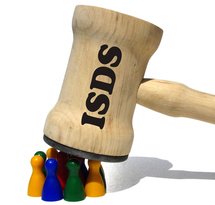
Remember the widespread protests against trade agreements TTIP and CETA? One of the main worries was the Investor-State Dispute Settlement (ISDS) mechanism these treaties contain. Now the European Commission has proposed to set up a Multilateral Investment Court. Is that good news?
-
Publication / 19 September 2016
-
Publication / 12 November 2020
-
News / 21 January 2019
Launch of European campaign against unfair investment agreements

Today an alliance of more than 150 organisations, trade unions and social movements in countries across Europe is launching a joint programme against unfair trade and investment agreements, and especially against the controversial Investor-to-State-Dispute-Settlement (ISDS) mechanism. Under ISDS, investors can bring complaints against states whose social and environmental legislation pose a threat to their profits.
-
Publication / 7 July 2022
-
News / 19 June 2018
NGO's send letter to Minister Kaag to call for termination of BIT with Burkina Faso
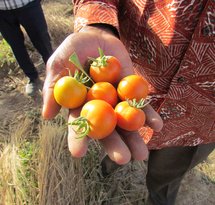
Today, Both ENDS sent a letter, signed by various civil society organisations, to Sigrid Kaag (Dutch Minister of Aid & Trade) reminding her of an important deadline and to urge her to terminate the Bilateral Investment Treaty (BIT) that exists between the Netherlands and Burkina Faso. The treaty, which can be very harmful for a poor country such as Burkina Faso, will automatically be renewed for the next 15 years if it is not terminated before July 1st this year.
-
Publication / 31 December 2020
-
Letter / 10 February 2020
Open letter to the Dutch government: vote against CETA
Over 70 organisations worldwide have signed an open letter to call upon the Dutch government to vote against CETA - the 'Comprehensive Economic and Trade Agreement'between Canada and the EU this week. They have serious concerns about the negative global social and environmental impacts of the CETA trade deal and similar upcoming European Union's trade agreements.
-
News / 26 January 2017
No lessons learnt from TTIP and CETA in current trade negotiations EU - Indonesia
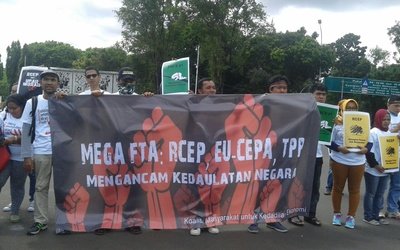
From 24-28 January 2017, the second round of negotiations towards a Comprehensive Economic Partnership Agreement (CEPA) takes place between the EU and Indonesia. The proposed agreement covers far-reaching liberalisation and deregulation that can have severe impacts on society, people and the environment. Civil society organisations, including Both ENDS, released a statement to express their concern and call upon the negotiators to halt the process and fully assess the potential environmental and social impacts of the agreement.
-
Dossier
Rights for People, Rules for Corporations – Stop ISDS!
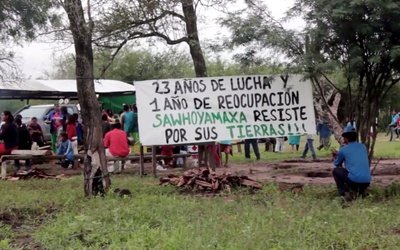
Indigenous communities in Paraguay saw their attempts to regain their ancestral lands thwarted by German investors. In Indonesia, US-based mining companies succeeded to roll back new laws that were meant to boost the country’s economic development and protect its forests. This is the level of impact that investment treaties can have on social, environmental and economic development and rights. Why? Because of the ‘Investor-to-State Dispute Settlement’ clauses that are included in many such treaties.
-
Event / 20 June 2017
Eurodad-conference ‘Alternative policies for a sustainable world’
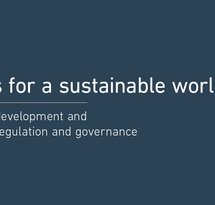
Eurodad's International Conference is co-hosted by Eurodad's Dutch members ActionAid Netherlands, Both ENDS, OIKOS, Oxfam Novib and SOMO. It will be held in the Caballero Fabriek in The Hague.
-
News / 2 April 2014
Saying NO! to free trade agreements
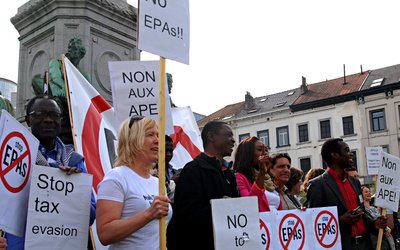
Today, on the 2nd of April, activists from Africa and Europe are staging a protest action in front of the European Parliament in Brussels to make the voices of the poor and marginalised citizens heard. Holding banners and chanting slogans to the beat of djembe drums, they asked the African and European governments to prioritise peoples’ rights and interest in their trade deals and particularly, in the EU trade and development policies with Africa. Why do they protest at this particular moment and what is Burghard Ilge of Both ENDS doing there?
-
Dossier
Trade agreements
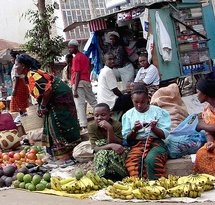
International trade agreements often have far-reaching consequences not only for the economy of a country, but also for people and the environment. It is primarily the most vulnerable groups who suffer most from these agreements.
-
Press release / 23 May 2023
60th anniversary of Dutch bilateral investment treaties no cause for celebration

On 23 May, the Netherlands celebrates 60 years of bilateral investment treaties (BITs). The first BIT was signed with Tunisia in 1963. These treaties were intended to make an important contribution to protecting foreign investments by Dutch companies. A study by SOMO, Both ENDS and the Transnational Institute (TNI), however, shows that in practice they mainly give multinationals a powerful instrument that has far-reaching consequences people and the environment worldwide.
-
News / 11 October 2019
Rights for people, rules for corporations: the case of Paraguay
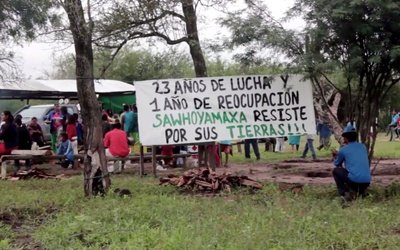
Indigenous communities in Paraguay saw their attempts to regain their ancestral lands thwarted by German investors. This is the level of impact that investment treaties can have on social, environmental and economic development and rights. Why? Because of the ‘Investor-to-State Dispute Settlement’ (ISDS) clauses that are included in many such treaties.
-
Letter / 26 June 2020
Letter to governments over wave of Covid-19 claims in 'corporate courts'
Countries could be facing a wave of cases from transnational corporations suing governments over actions taken to respond to the Covid pandemic using a system known as investor-state dispute settlement, or ISDS. 630 organisations from across the world, representing hundreds of millions of people, are calling on governments in an open letter to urgently take action to shut down this threat.



